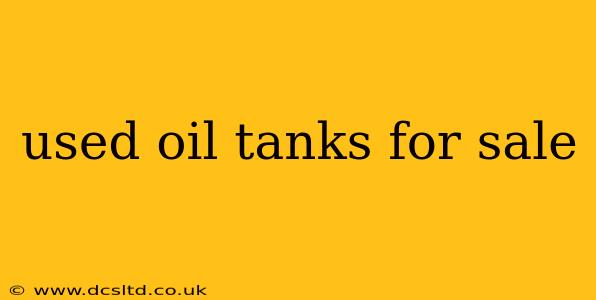Finding the right used oil tank can be a daunting task. With varying sizes, materials, and conditions, it's crucial to understand what to look for before making a purchase. This comprehensive guide will help you navigate the market for used oil tanks, ensuring you find a safe and suitable option for your needs.
What Types of Used Oil Tanks Are Available?
The market for used oil tanks offers a variety of options, each with its own pros and cons. Common types include:
-
Steel Tanks: These are the most common type, offering durability and affordability. However, steel tanks are susceptible to rust and corrosion, so careful inspection is crucial. The thickness of the steel is a key factor in determining its lifespan.
-
Fiberglass Tanks: Fiberglass tanks are known for their corrosion resistance and lighter weight. They are often more expensive than steel tanks but can last longer if properly maintained.
-
Plastic Tanks (HDPE): High-density polyethylene (HDPE) tanks are another corrosion-resistant option, offering good chemical resistance and a relatively long lifespan. They are typically lighter than steel tanks, but may not be as strong.
What Size Oil Tank Do I Need?
Determining the appropriate size depends heavily on your storage needs. Consider:
-
Daily/Weekly Oil Consumption: How much oil do you use regularly? A tank that's too small will require frequent refills, while one that's too large will tie up unnecessary capital.
-
Storage Space: How much space do you have available for the tank? Factor in access for delivery and potential expansion needs.
-
Future Growth: Consider your potential oil consumption in the coming years to avoid having to replace the tank prematurely.
How to Inspect a Used Oil Tank Before Purchasing
Thoroughly inspecting a used oil tank is paramount to avoid potential problems down the line. Key areas to check include:
-
Corrosion and Rust: Look for signs of rust, pitting, or other corrosion damage, particularly at seams and the bottom of the tank. Significant corrosion compromises the structural integrity and can lead to leaks.
-
Leaks: Carefully inspect all seams, connections, and the tank's base for any signs of leaks or seepage. A pressure test is highly recommended.
-
Tank Integrity: Check for dents, cracks, or other damage to the tank's structure. Even minor damage can compromise the tank's integrity.
-
Cleanliness: Ensure the tank is clean and free from debris or contaminants. Residual oil or other substances can contaminate future oil storage.
-
Documentation: Request any available documentation, including maintenance records, previous inspections, and any certifications.
Where Can I Find Used Oil Tanks for Sale?
Used oil tanks can be found through various channels:
-
Online Marketplaces: Sites like eBay and Craigslist often list used oil tanks for sale. However, thorough inspection is crucial before purchasing.
-
Liquidation Auctions: Companies that are liquidating assets may offer used oil tanks at auction.
-
Used Equipment Dealers: Many dealers specialize in used industrial equipment and may have used oil tanks available.
-
Local Businesses: Check with local businesses that may be upgrading or replacing their oil storage tanks.
What are the Regulations Regarding Used Oil Tank Storage?
Regulations surrounding oil tank storage vary by location. Before purchasing a used oil tank, familiarize yourself with all applicable local, state, and federal regulations. These regulations often cover:
- Tank placement and safety: Regulations may specify minimum distances from buildings, water sources, and other hazards.
- Secondary containment: Requirements might exist for secondary containment systems to prevent environmental contamination in case of a leak.
- Permitting and inspections: Permits may be required for installation or use of the tank. Regular inspections might also be mandatory.
How Much Does a Used Oil Tank Cost?
The cost of a used oil tank varies greatly depending on size, material, condition, and location. Expect to pay significantly less than a new tank, but remember that the condition and required repairs can influence the overall cost.
What are the Environmental Considerations When Using a Used Oil Tank?
Responsible handling of used oil tanks and their contents is crucial for protecting the environment. This includes proper disposal of any residual oil and adhering to all environmental regulations. Improper handling can lead to significant environmental damage and potential legal repercussions.
By carefully considering these factors and performing a thorough inspection, you can confidently purchase a used oil tank that meets your needs while ensuring safety and environmental responsibility. Remember that consulting with a professional can also prove invaluable in the selection and installation process.
